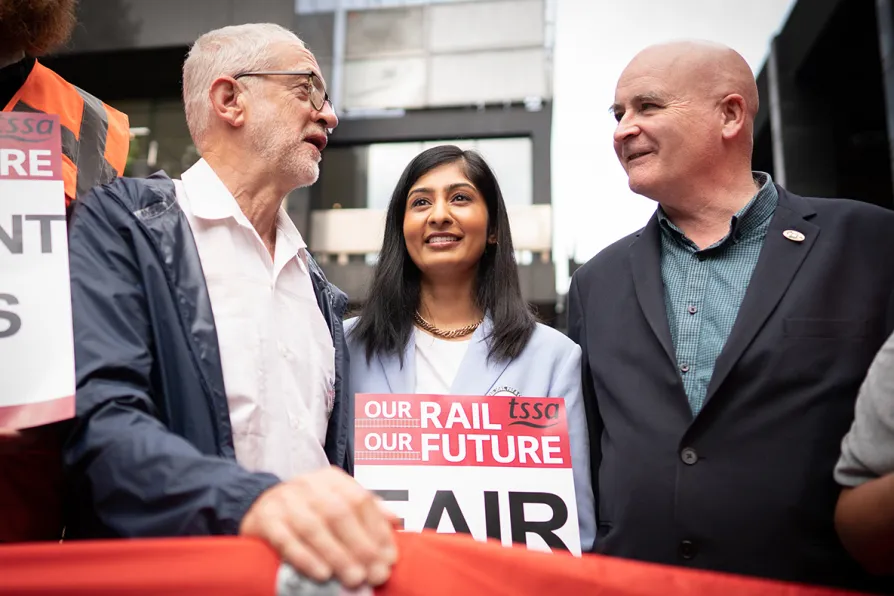
 Jeremy Corbyn (left), Zarah Sultana, MP for Coventry South and Mick Lynch, then general secretary of the Rail, Maritime and Transport union (RMT) (right) on the picket line outside London Euston train station, August 18, 2022
Jeremy Corbyn (left), Zarah Sultana, MP for Coventry South and Mick Lynch, then general secretary of the Rail, Maritime and Transport union (RMT) (right) on the picket line outside London Euston train station, August 18, 2022
FOUR hundred thousand and counting. Sign-ups to be part of founding the new party initiated by Jeremy Corbyn and Zarah Sultana already surpass the membership of any existing political party in Britain.
While the appetite for a left alternative to Labour has long been clear, even supporters of the project cannot have expected a response on this scale.
The level of interest exposes an important fact about Labour’s hard-right turn under Keir Starmer’s leadership from 2020.
We knew it was undemocratic — the policy of a leader elected on false claims to stand for continuity with the Corbyn years, and imposed not by persuasion but by expulsions, suspensions and bans on discussion and debate.
The retort to those who accuse the new party of splitting the left vote is obvious, even if Starmer’s Labour could still be considered a left vote, and even if Labour wasn’t haemorrhaging support in all directions anyway: those founding the new party did not simply decide to set themselves up as rivals. Rightly or wrongly, they only determined to stand against Labour after they were forced out of it. It is demonstrably Starmer’s fault that he will soon face an electoral challenge from the left.
But more significantly, the enthusiasm for a new Corbyn project explodes the narrative that Labour’s recent socialist period was an aberration, unreflective of public opinion and electorally suicidal.
It’s a line still adopted by party spokespeople intoning that Starmer need not worry since “the electorate has twice delivered its verdict on a Corbyn-led party.” Brushing over both the way the Corbyn leadership hugely increased the Labour vote between 2015 and 2017 and the fact that even in 2019 it won the support of over half a million more voters than Keir Starmer ever did.
In fact the mass movement known as Corbynism attracted hundreds of thousands of activists and won Labour millions more votes because it drew on deep disillusionment with the previous cross-party consensus at Westminster, and a pervasive feeling that Britain had been going in the wrong direction for decades. These feelings are not weaker now than in 2015: the simultaneous collapse of Labour and the Tories in the polls shows they are stronger.
They are not expressed predominantly in left-wing terms: they drive the current poll lead of Reform UK. But a rejection of the post-Thatcher political settlement is in reality a rejection of the consequences of the right’s policies — privatisation, deregulation and deindustrialisation — since these have been pursued by both governing parties since the 1980s.
And the exclusion of a socialist answer to this dilemma is not based on any real shift in public opinion but an artificial product of the administrative suppression of the left within the Labour Party. Given another outlet, it can regain its status as a movement of national significance while opening up space within Labour to fight the right as well.
None of this should inspire naivety over the difficulties a new party will face. Polling suggests it will attract a lot of votes: but without denting the commanding lead currently enjoyed by Reform. Looking at why Labour was able to raise its vote across the board in 2017, but collapsed so badly in 2019 is key — as is looking outwards to the whole working class, and avoiding the sometimes insular and hectoring character of “left” politics. A retread of the defeated 2015-19 project is unlikely to be a recipe for future success.
Even so, this is a very encouraging beginning. The march of authoritarianism and racism across this country, the disgusting consensus behind complicity in Israeli genocide and the attempt to keep public ownership and wealth redistribution off the table can all be challenged by the emergence of a left movement on this scale. No socialist can close their eyes to that.










